
Thailand's agricultural sector offers a variety of job opportunities, especially in areas such as crop farming, aquaculture, and agroforestry. Positions range from field workers and farm managers to agricultural engineers and researchers, catering to diverse skill sets and educational backgrounds. The growth of organic farming and sustainable agriculture is creating demand for specialists in environmental practices and certifications. With ongoing government support and investment in agriculture technology, prospects for career advancement in this field continue to expand.
Job Description
Agriculture jobs in Thailand involve a variety of roles, from planting and harvesting crops to managing livestock and overseeing farm operations. Workers might engage in rice cultivation, which is a staple of the Thai economy, or participate in the production of fruits and vegetables for local markets. You will often find opportunities in sustainable farming practices that emphasize organic produce and environmental conservation. The sector also offers positions in agricultural technology, where innovation plays a crucial role in improving productivity and efficiency.
Requirement
Agriculture jobs in Thailand offer diverse opportunities in various sectors, including farming, aquaculture, and food processing. Employers typically look for candidates with a background in agricultural science, horticulture, or related fields, as well as practical experience in farm operations or production management. Skills in sustainability practices and knowledge of local agricultural regulations can give you a competitive edge. Language proficiency in Thai and basic English may also be beneficial for effective communication within the industry.
Salary and Perks Expected
Agriculture jobs in Thailand offer competitive salaries, typically ranging from 15,000 to 25,000 THB per month, depending on experience and specialization. Various perks often accompany these positions, such as housing allowances, health insurance, and transportation support, making them appealing for both locals and expatriates. The agricultural sector in Thailand is diverse, encompassing roles in farming, agronomy, and agri-business management, which continually seeks skilled workers. With the increasing emphasis on sustainable practices, opportunities for growth and development in this field are abundant, allowing you to build a rewarding career in agriculture.
Similar Job Names
- Agricultural Engineer
- Agronomist
- Farm Manager
- Agricultural Scientist
- Horticulturist
- Animal Scientist
- Crop Consultant
- Soil Scientist
- Agricultural Technician
- Pest Control Advisor
- Livestock Manager
- Fruit and Vegetable Export Manager
- Agricultural Business Consultant
- Irrigation Specialist
- Seed Production Manager
- Agricultural Policy Analyst
- Organic Farming Specialist
- Aquaculture Technician
- Farm Equipment Operator
- Agricultural Researcher
Job Expectation Concept
Agriculture jobs in Thailand encompass a diverse range of roles, including farming, agribusiness management, and agricultural research. The sector is crucial for the country's economy, employing millions and contributing significantly to food production and exportation. Opportunities exist in both traditional practices and modern technologies, enabling enthusiasts to engage in sustainable farming and innovative agricultural solutions. Seeking a career in this vital industry offers a chance to support local communities while participating in Thailand's rich agricultural heritage.
Career Advantage and Weakness
Agriculture jobs in Thailand offer significant career advantages, such as job security and the potential for a steady income, given the country's reliance on agriculture as a primary economic sector. Professionals in this field can benefit from various government support programs aimed at boosting agricultural productivity and sustainability. However, challenges such as variable weather conditions, limited access to advanced technology, and fluctuating market prices can be significant weaknesses. Engaging in continuous education and training can help you mitigate these weaknesses and enhance your overall employability in the sector.
Important Thing Must Know
Agriculture jobs in Thailand offer a diverse range of opportunities, reflecting the country's rich agricultural landscape. The sector includes rice farming, rubber plantation management, and aquaculture, catering to both local and export markets. Modern agricultural practices are evolving, emphasizing sustainability and the use of technology, which can enhance productivity and efficiency. Government initiatives often support training programs, providing you with resources to improve skills and grow professionally. Understanding local agricultural trends and the importance of seasonal cycles can significantly enhance your job prospects in this thriving industry.
Alternative Career Options
In Thailand, agricultural professionals can explore diverse career options beyond traditional farming roles. Opportunities exist in agribusiness management, where skills in marketing and supply chain management are essential for increasing productivity and profitability. You might consider positions in research and development, aiming to innovate sustainable farming practices or develop new crop varieties suited to Thailand's unique climate. The rise of agro-tourism presents another exciting avenue, allowing individuals to engage with travelers while promoting local agricultural heritage and sustainable practices.
Companies List
- Charoen Pokphand Foods Public Company Limited (CPF)
- Thai Union Group Public Company Limited
- PTT Group
- Betagro Public Company Limited
- Rangsit University Agricultural Research Institute
- Kasetsart University
- CP All Public Company Limited
- The Siam Cement Public Company Limited (SCC)
- Oasys Farms Thailand
- Agro Asia Company Limited
List of Ideal City
Chiang Mai offers a rich agricultural landscape with opportunities in organic farming and sustainable agriculture practices. Ubon Ratchathani is known for rice cultivation and provides various job prospects in agribusiness and research. Nakhon Ratchasima, often referred to as Korat, supports a diverse range of crops and livestock, making it a hub for agricultural innovation. In southern Thailand, Songkhla presents ample opportunities in seafood and aquaculture sectors, benefiting those looking to develop their career in agriculture.
 jobs-thailand.com
jobs-thailand.com